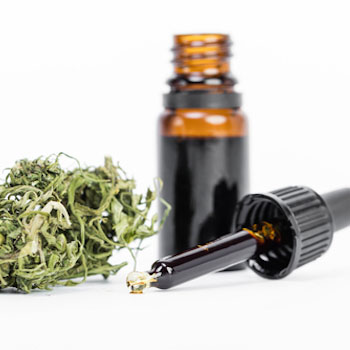Cannabidiol (CBD) is being used in a variety of products, from supplements to creams to vape oils. Before you use any product containing cannabidiol, here’s what you need to know.
CBD products of any kind are prohibited for Service Members.
What is cannabidiol?
Cannabidiol (CBD) is a chemical compound belonging to the class of plant chemicals called “cannabinoids.” CBD occurs naturally in the plant Cannabis sativa (marijuana and hemp). However, it also can be made in a laboratory (synthetic). Preparations of CBD can contain varying amounts of delta-9 tetrahydrocannabinol (THC, the psychoactive ingredient in marihuana), which is a controlled substance. How much THC depends on the Cannabis sativa plant the CBD came from and the process used to extract CBD from the plant.
Is CBD legal?
When the December 2018 Agriculture Improvement Act (Farm Bill) was signed into law, the legal status of CBD came into question. The Farm Bill legalized hemp by defining it as Cannabis sativa with less than 0.3% THC by dry weight. Since then, a variety of CBD products have appeared on the open market. For information about the legal status of CBD and other cannabis-derived products, please visit the Questions and Answers section of FDA’s web page.
Unless every batch of a CBD product has been tested by a third-party laboratory, there is no way to know for certain whether the product contains a significant amount of THC. If you use something that has enough THC, it could result in a positive drug test.
CBD is the active ingredient in one FDA-approved drug—Epidiolex®, used to treat seizures in children—which means CBD can be prescribed by a physician for its approved use: control of seizures. Some states have laws permitting certain patients to use CBD under medical supervision, but these state laws do not change the status of CBD under federal law.
In November 2019, FDA published a Consumer Update in which they clearly state “It is currently illegal to market CBD by adding it to a food or labeling it as a dietary supplement.” The same web page explains FDA’s decision and describes what they are doing to learn more about the safety and other effects of CBD.
Can I use it in the military?
For Service Members, the message is simple: Products with CBD (and hemp) are prohibited for use, regardless of THC concentration (except when the FDA-approved drug Epidiolex® is prescribed). CBD products include topical, inhaled (vaping), and oral products. For an in-depth look at the military legal viewpoint, you can read OpJAGAF 2019-23 (Air Force specific, but informative).
In addition, use of synthetic cannabinoids (which include CBD) is specifically mentioned in DoDI 1010.01 as an offense under The Uniform Code of Military Justice (UCMJ).
What types of products might contain CBD?
CBD products can be found in many forms, including oils, capsules, gummies, syrups, teas, and topical lotions and creams, as well as in pet products. CBD often is marketed to support overall health, wellness, and vitality, but some products have been marketed to prevent, treat, or cure serious diseases such as Alzheimer’s, cancer, and the like without any evidence to support these claims. Such claims make the promoted products “unapproved drugs.” As mentioned above, FDA has approved one drug in which CBD is the active ingredient—Epidiolex®.
FDA clearly states that CBD products cannot be sold as dietary supplements. Similarly, FDA clearly states that CBD cannot be added to foods sold in interstate commerce.
Are there other concerns about products containing CBD?
Although CBD cannot be lawfully added to foods or dietary supplements, FDA has recently received an increasing number of adverse-event reports about CBD-containing products that consumers might confuse with conventional foods and beverages. These types of products could result in consumption of CBD accidentally or in excess. This especially applies to CBD products sold in forms that are appealing to children (such as gummies, cookies, and candies).
According to FDA, “…the use of CBD raises safety concerns, especially with long-term use. Scientific studies show possible harm to the male reproductive system, including testicular atrophy, harm to the liver, and interactions with certain medications. The FDA has not found adequate information showing how much CBD can be consumed for how long before causing harm.” FDA is also concerned about the safety risks associated with CBD use by women who are pregnant or breastfeeding and by its possible interactions with caffeine. For more information, read FDA’s article.
CBD liquids sold for vaping present additional concerns. Reports of severe adverse events associated with some “CBD” vaping products prompted testing, which revealed the presence of dangerous synthetic cannabinoids—and in some cases, no CBD at all. For more information about cannabis, including service-specific policies that cover the use of CBD, see the OPSS article about hemp.
Want this information as a shareable graphic? OPSS has a handout on CBD and hemp.
Updated 28 November 2022

